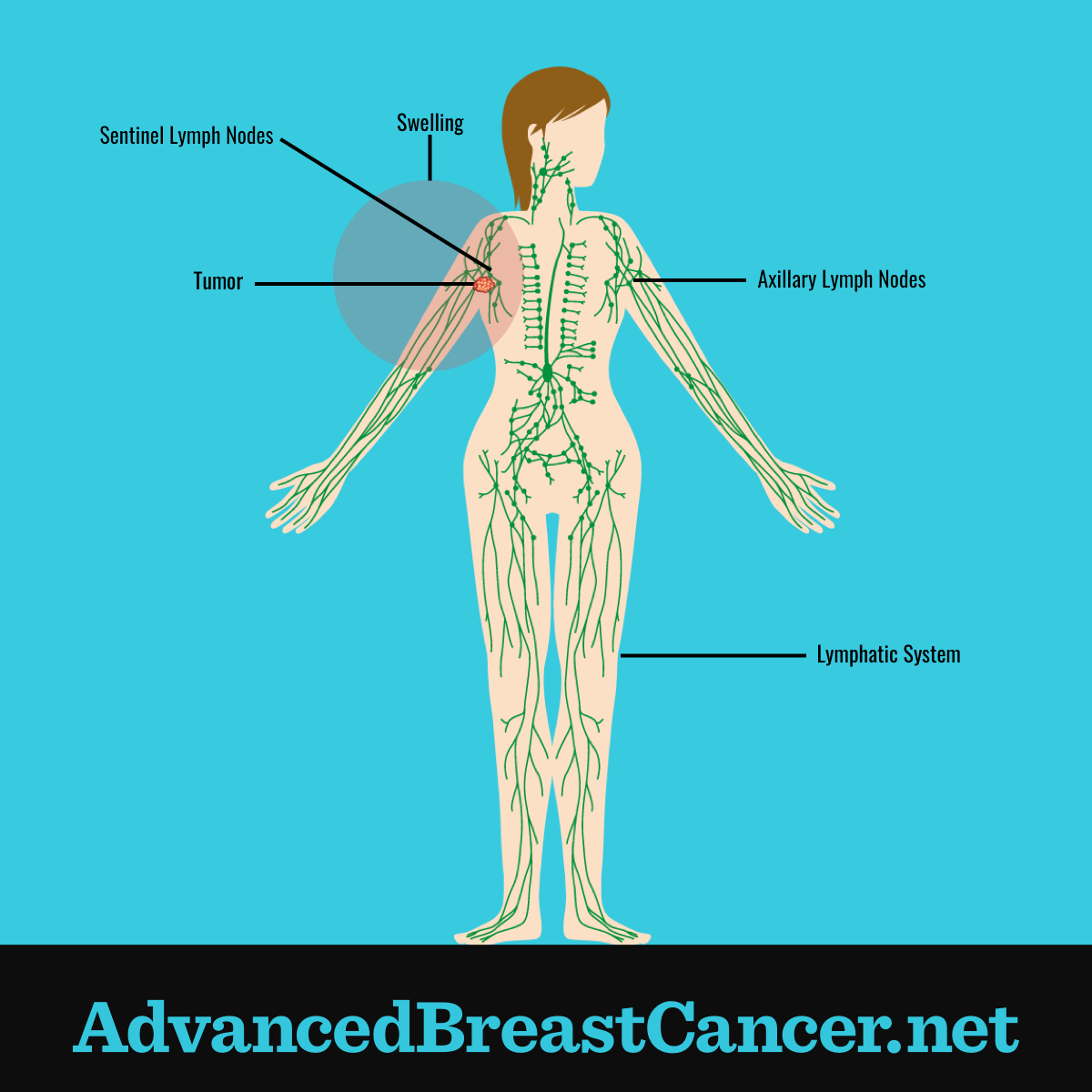Lymphedema and Advanced Breast Cancer Treatment
Reviewed by: HU Medical Review Board | Last reviewed: June 2023 | Last updated: September 2023
Lymphedema is a condition of irregular swelling that may occur after surgery or radiation for breast cancer that involves the lymph nodes. Lymphedema can cause the hand and arm to swell. In certain cases, the breast, chest, or underarm may also swell.1
Figure. Lymphatic system showing swelling
How the lymphatic system works
The lymphatic system is part of the immune system that carries fluid called lymph through the body and is made up of lymphatic vessels, lymph nodes, collecting ducts, and several organs, including the spleen, thymus, and tonsils. The main functions of the lymphatic system are to eliminate damaged cells from the body and to defend the body against potential infection and cancer.2
Lymph is a clear-to-white fluid that seeps out of capillaries into tissues of the body. Lymph contains nutrients that help nourish these tissues. Lymph also carries foreign substances, like bacteria, viruses, cancerous cells, and damaged cells to the lymph organs for removal, and many white blood cells are present in the lymph.2,3
Lymph nodes are bean-shaped structures that are found along the lymphatic vessel pathways. The function of the lymph nodes is to filter the lymph before it goes back to the bloodstream. Lymph nodes contain many white blood cells, particularly lymphocytes and macrophages, which are key components of the immune system and help the body fight off infection and remove damaged cells, like cancer cells.2
Why lymphedema occurs
Lymphedema can occur when the lymph nodes have been removed, following a lymph node biopsy, or when the lymph nodes are damaged, such as during radiation to the area. The remaining lymph nodes may not be able to carry all the lymph fluid from the area. Lymphedema can occur months or years after treatment, and it is a chronic condition.1,4
Lymphedema can occur after an injury, infection, or strenuous activity of the arm or hand. Some people notice lymphedema after air travel, due to the change in air pressure.1
One study found that lymphedema occurred in 42% of women within five years of a breast cancer diagnosis. For most of those (89%), lymphedema occurred during the first three years after diagnosis. However, it can occur several years after the original treatment.5
Symptoms of lymphedema
When lymphedema occurs, the arm, hand, breast, or chest may become swollen and feel heavy. The affected area may also be achy or painful, and the skin may feel tight. The swelling in the arm or hand may cause decreased flexibility in the elbow or fingers. The swelling may be accompanied by pitting, where the skin stays indented after being pressed.1
Lowering the risk of lymphedema
There are several actions that can help to prevent experiencing lymphedema, including1,6:
- Maintaining a healthy body weight
- Engage in regular gentle exercises to improve lymph drainage (check with your doctor if you have an exercise restriction)
- Promptly cleaning and applying antibiotic ointment to any cuts on the affected hand or arm
- Ask for blood draws or injections to be given on the non-affected side (if lymph nodes were only taken from one side)
- Use sunscreen and sun protective clothing to prevent sunburn
- Wear gloves when doing dishes, gardening, or cleaning
- Use electric razors for shaving under the arm
- Avoid any tight jewelry or clothing, such as those with elastic
Treatment for lymphedema
There are several techniques that can be used to help manage the symptoms of lymphedema, including the use of compression bandages or sleeves, manual lymph drainage therapy, and surgical techniques, such as transferring lymph nodes from another area of the body to the affected site.6
Lymphedema can impact quality of life
It is important to get prompt treatment for lymphedema and manage the symptoms. Lymphedema can not only cause physical discomfort, but it can also decrease a person’s quality of life. The physical symptoms can limit a person’s range of motion, strength, and function. Dealing with the loss of function and the appearance of a swollen limb can cause body issues, social avoidance, anxiety, or depression. While lymphedema ranges in severity from mild to severe and not everyone experiences emotional and mental distress from lymphedema, it is important to get help from a healthcare provider for all symptoms – physical, mental and/or emotional.
